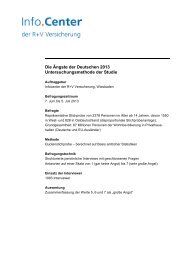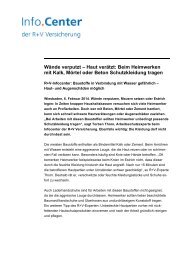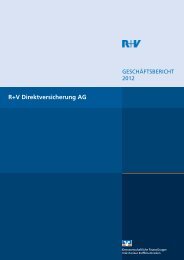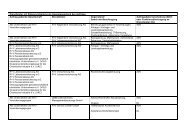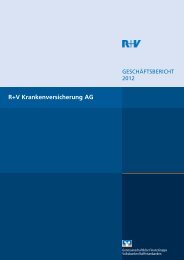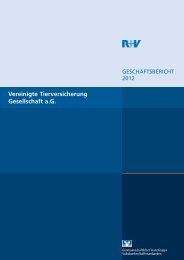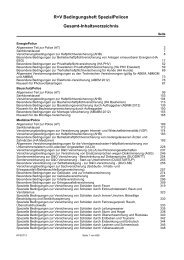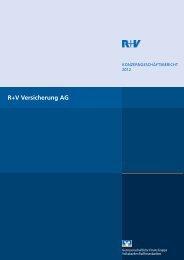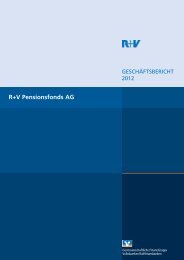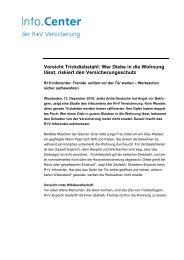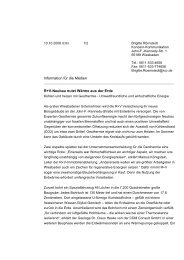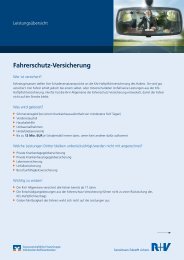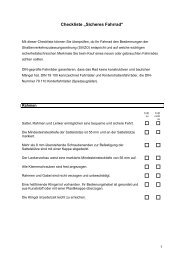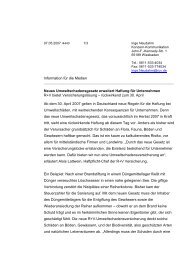R+V Versicherung AG Annual Report
R+V Versicherung AG Annual Report
R+V Versicherung AG Annual Report
You also want an ePaper? Increase the reach of your titles
YUMPU automatically turns print PDFs into web optimized ePapers that Google loves.
Apart from the extraordinary burden of the<br />
terrorist attacks in the US, 2001 also saw<br />
a large number of large claims. These<br />
included the explosion at a fertilizer plant<br />
near Toulouse/France, the earthquake in<br />
El Salvador, tropical storm “Alison” in the<br />
southern US, typhoon “Nasi” in Taiwan and<br />
the total loss of the “Petrobras” oil platform<br />
off the coast of Brazil.<br />
Western Europe<br />
Growth in industrialized countries of<br />
Western Europe declined to an extent not<br />
seen since the beginning of the 1990s.<br />
While the Japanese economy once again<br />
slid into recession, the economy in the<br />
European Union continued to grow for a<br />
time; nevertheless these countries were<br />
increasingly caught up in the global economic<br />
downturn. Of the large countries, the<br />
UK was the only economy that remained<br />
robust. International trade declined, leading<br />
to a correspondingly pronounced downturn<br />
in industry. While private consumption<br />
remained robust in many cases, corporate<br />
investment generally declined. The labor<br />
market did not remain unscathed either,<br />
with the slight improvements previously<br />
seen tailing off again.<br />
Inflationary trends which had increased in<br />
2000 and were ultimately responsible for<br />
the central banks’ restrictive measures,<br />
weakened in 2001, partly thanks to the<br />
drop in oil prices. The core inflation rate<br />
remained persistently high, however.<br />
8<br />
Monetary policy was relaxed during the<br />
course of the year in reaction to the economic<br />
slump. Interest rates were lowered<br />
once again in a concerted effort following<br />
the terrorist attacks in the US. All in all, the<br />
central banks were on a clearly expansionary<br />
course, while financial policy was relatively<br />
restrained.<br />
In terms of exports, countries which had<br />
specialized in IT products suffered the<br />
greatest setbacks, losing global market<br />
share. Finland, which had reported export<br />
growth of up to 20% in the previous year,<br />
posted a decline in exports in the year<br />
under review. What was surprising was that<br />
trade within the European Union declined at<br />
times, even though domestic demand<br />
expanded in most member states.<br />
Exports and imports in the majority of<br />
countries and regions generally developed<br />
along the same lines, especially since economic<br />
development was surprisingly parallel,<br />
both in relation to the strong upswing<br />
until mid-2000 and to the downturn. Since<br />
exchange rates hardly fluctuated, the<br />
balance of trade and balance of payments<br />
for the individual countries changed very<br />
little overall.<br />
The European insurance markets bottomed<br />
out at the beginning of the year under<br />
review and direct insurance rates began to<br />
develop positively again in a number of<br />
markets. However, these increases were<br />
unable to offset claims losses, which<br />
remained unsatisfactory. The impact of<br />
large claims remained moderate in the first<br />
half of the year, with the main events being<br />
the sinking of the oil platform off the<br />
Brazilian coast and tropical storm “Alison”<br />
which led to severe flooding in the southwest<br />
of the US.



